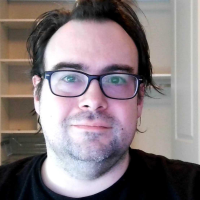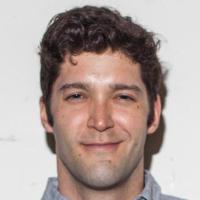00:00:20.600
So our first storyteller, I'm pleased to introduce Davis Frank. He is the associate director of the San Francisco office of Pivotal Labs, and he's in charge of their open source efforts. I'm super glad he agreed to be here today. Ladies and gentlemen, please welcome Davis Frank.
00:00:41.760
Alright. Is the microphone working? Thanks, Sarah. If someone sends you an email on a Tuesday and asks if you could tell a story on Saturday, just say yes. Thank you very much; I'm thrilled to be here. I was asked to tell you guys a story, and I said great, no problem. I even have a Ruby-themed story since this is RubyCon, and I want to tell you a little bit about my career.
00:01:14.000
I spent a good chunk of time in the management side of the software industry, and I got there because I had a whole bunch of crazy software experiences. I’m sure I’ve told some of you those stories before. Eventually, I realized I wasn't as thrilled about writing code as I used to be. It was hard; shipping was hard. So, like many people, I transitioned into management. You know the saying, 'Those who can’t code, manage.' That lasted for a while, with a couple of different jobs. Then in 2006, I had my fill of my employment situation, and I quit.
00:01:40.000
I still had hair back then! But then I found myself in a tough position; I was a software manager now, so I had to find another management job. I had a couple of really lousy interviews. In one interview, I experienced what was closest to an out-of-body experience. I was looking down and hearing myself say things I never thought I would say. So I withdrew from that job search and decided to take a few months off, but at that point, I had no idea what to do next.
00:02:27.160
Having spent time in management, I was still interested in software processes, so I contemplated what my next steps should be. I reached back into 2002, when I got to meet Kent Beck around the time he was doing the book tour for the Extreme Programming white book. I enjoyed that talk and got to spend time with him and some of my co-workers at The Nut House in Palo Alto. I did not drink MGD that night, but I spoke with Kent and got really inspired by what he presented.
00:02:54.960
Kent introduced a set of new first principles that invalidated many of the processes we had been using for a long time. He encouraged us to revisit these principles and iterate forward, which was the essence of Extreme Programming. With that in mind, I had dedicated time, and I needed to find something technical to do. A friend of mine named Dave suggested I explore Ruby on Rails in the summer of 2006, so I bought the books. I went through the Pickaxe book and also read 'Agile Development with Rails.' I had a really good time.
00:03:41.679
Before I knew it, I was coding again and rediscovering how much fun it was. I learned more about Ruby and realized that Ruby exists to make us happy. Suddenly, I was happy again! I had spent a lot of time that summer coding, often from a nearby Apple Store, tapping into their Wi-Fi, and doing things like writing documentation for the Rails Wiki to help others set up MySQL correctly.
00:04:01.000
I even discovered how to do Rails development in Eclipse on Windows. It reminded me of my time writing assembly code in the 90s, shortly after I graduated. I was having so much fun coding again. It turns out I had that spark in me the whole time; I just got a bit distracted.
00:04:41.360
So I spent that summer solving software problems that came up because the thrill of building web applications was back in my life. But eventually, reality set in—bills needed to be paid. So I returned to work, bounced through a startup, and eventually found my way to Pivotal Labs, where I am now an Associate Director. There are several of us with that title, but what it means for me is that I get to help others with their projects.
00:05:03.840
I still do some coding, but now I help at a meta level. I share what I've learned with others, mostly in Ruby, and it’s rewarding. We all get happy when we work together, and that’s a big part of what Ruby is about. Some other happenings in my journey include my foray into JavaScript. I had to learn how to make that language enjoyable for me.
00:05:29.639
We created a JavaScript test framework that mimicked RSpec. I share this to emphasize that while I transitioned to working with JavaScript, I haven’t given up on Ruby. Instead, over the last seven years, I’ve effectively test-driven my career. It’s about exploring things that seem interesting, seeing if they fit, and then moving forward if they do. And if they don’t, being courageous enough to start anew.
00:06:08.399
I haven’t abandoned Ruby. In fact, I wrote a gem for this presentation involving DEJS, which was kind of cool. This year, I created a tool called Anchor Man to help turn Git logs into release notes because release notes can be a hassle. I share this not to boast, but to illustrate how far I've come. Ten years ago, I would never have imagined I'd be involved in open-source projects contributing to the community.
00:06:56.440
I want to encourage you to think deeply about your own careers, just as I did. Consider what you want to pursue next and push yourself toward it. It’s not just about the coding; your career itself can be treated like an interesting problem to solve. Reflect on it and treat it with the same care you would give to your code.
00:08:05.420
Thank you to my friend Dave, who first encouraged me to check out the 37 Signals screencasts, and to Kent for his insight into why waterfall development is painful. I also want to acknowledge Matt for making it easy for me to return to coding. I was able to apply the object-oriented principles I learned years ago naturally in Ruby, which was an amazing experience.
00:08:51.680
I also want to thank all of you, whether I work with you now or have served as your client. Without the community, I wouldn’t be where I am today. We support each other, and it’s important to voice that gratitude. Overall, I am immensely thankful. To wrap up, I will share an epilogue: At RailsConf 2008, I had the chance to talk to Kent again. After I introduced myself as a Ruby developer at Pivotal Labs, he remarked that he wouldn’t have to worry about me ever again, to which I assured him he didn’t. Test-driven career—saved. Thank you all for your support and for allowing me to share my story.










